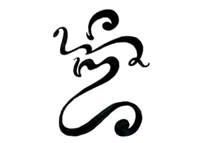Gamelan Çudamani
Who We Are after 25 years!
In the village of Pengosekan, Ubud, Bali is a family compound that is home to Çudamani, one of Bali’s most active and respected performing ensembles. Members are community of leaders who positively contribute to the artistic, cultural, and political life of their community through music and dance.
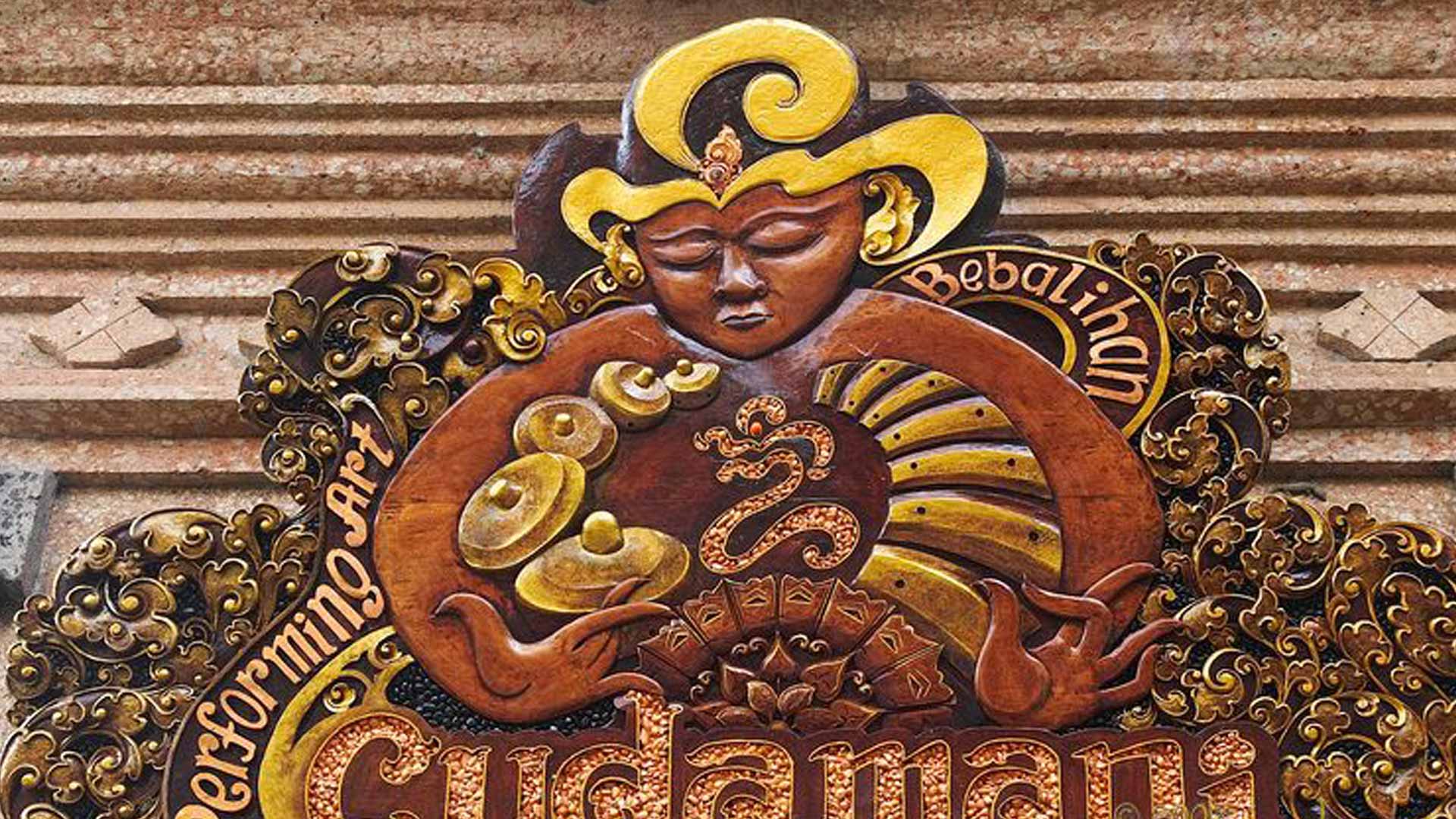
Group History
The group traces its roots to the 1970’s when the children of Pengosekan — a village well known for its community of painters, weavers, and musicians — gathered after school to play music in the village balai (pavilion). Over the years these independent-minded children formed a new kind of organization that has become a pride of the village.
Tourism has had a powerful impact on the arts in Bali — particularly so in Ubud, the famous tourist town just north of Pengosekan. By the 1990s most of the musicians of Ubud were playing for tourists in lieu of the needs of the community and members were hired and fired depending on their technical ability. The youth of Pengosekan often found themselves working in this system — experiencing the financial benefits of tourism while also being keenly aware of the artistic and cultural dangers of this arrangement.
In September 1997, Director Dewa Putu Berata, Artistic Director Dewa Ketut Alit, and others from Pengosekan called together a number of talented and promising young people from different areas in Bali to form Sanggar Çudamani.
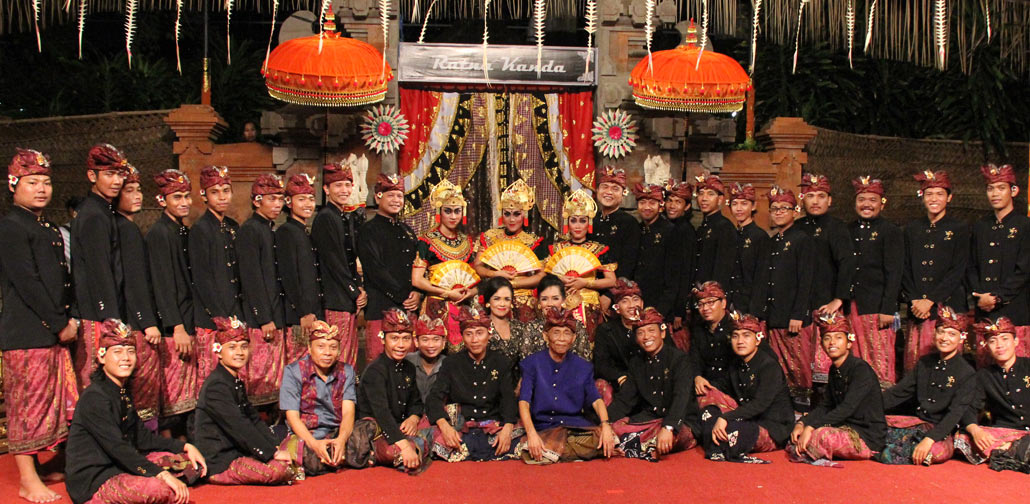
Philosophy and Practice
Çudamani maintains that the vitality of Balinese arts relies on the connection of performance to spiritual and social life and on the balance between strong roots and brave innovation. The group is in many ways, an activist community that responds to the philosophical, practical, and problematic issues that face Balinese artists today. The group invites master artists to Pengosekan to teach rarely performed repertoire, and members of the group also create new work. Çudamani artists are renowned for their inspired contributions to the repertoire of Balinese arts.
Performance
The group performs a diverse repertoire with astonishing technical precision, high collective spirit, and an impressive understanding of artistic nuance. Maintaining an active performance schedule requires a highly dedicated group of individuals — particularly since participation is voluntary. Since its creation, Çudamani is in great demand throughout Bali. The group’s technical accomplishments are unparalleled and their dedication to Balinese traditional values is their hallmark.
Dances
Dances performed by the group include the classic legong, rare pieces in the Kebyar genre, and new choreography. Çudamani’s outstanding musicianship and dance technique add weight to the revival of classic works. In addition, their efforts demonstrate a respect for and dedication to the senior masters who are too often dismissed as outdated by the young tourist-oriented artists of Bali. The dancers’ graceful bodies mirror every musical nuance of the gamelan as they bring to life vivid tales of gods and heroes of Balinese mythology and history. Beyond mere aesthetic entertainment, Balinese arts capture and amplify the shifting dimensions of human emotion, nature, the spirit world, and the cosmos.
Instruments
Of significance is the set of instruments used by Çudamani — the semarandana. This type of ensemble is quite rare in Bali, and Çudamani is on the forefront of work in this style. The tuning system used contains “extra” notes which allow the group to perform pieces from distinct gamelan ensembles Angklung, Semar Pegulingan, and Gong Kebyar on the same set of instruments. This of course allows the group great freedom and diversity in its repertoire with the numerous modes and tuning systems each having a distinct atmosphere, color, or mood.
Women and Gamelan
Çudamani has provided gamelan and dance instruction to hundreds of young people over their eighteen years of work in Pengosekan. Over fifteen years ago they committed to teaching gamelan to the young girls in their village. With the sustained determination of the senior members of Çudamani, their young women’s group performed at a level never before imagined possible for women, and essentially raised the standards of women’s gamelan to an entirely different level.
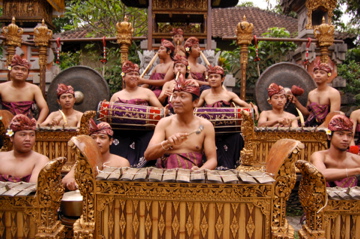
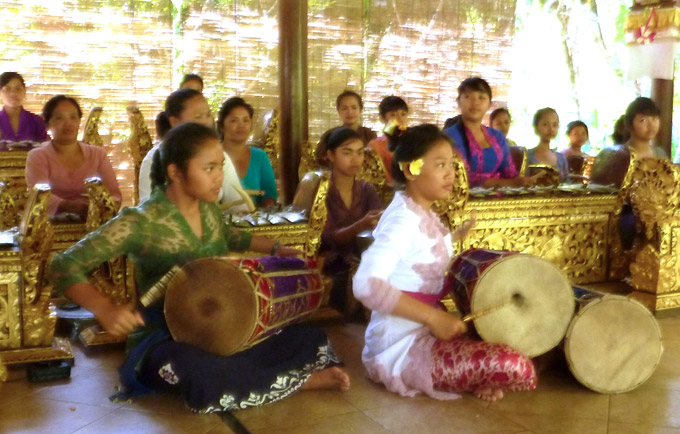
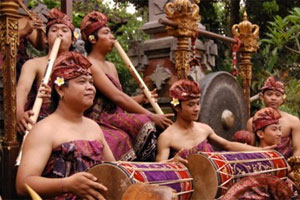
Pengosekan Village
Home of Çudamani
Pengosekan Village is located directly south of Ubud and is by most standards a relatively small village. Pengosekan also adjoins the famous gamelan village of Peliatan, however, unlike Ubud or Peliatan, Pentosekan does not have royal families in residence, no palaces or kings, indeed there are no Brahmans living in this village. This may explain why the encroachment of tourism is only recently being felt and the majority of villagers continue to live within the traditional value systems. As Gamelan gained prominence in Ubud and Peliatan during the 1950s, the village farmers of Pengosekan were determined to have their own gamelan. Over many years they pooled their money and purchased one instrument at a time. Dewa Putu Berata’s father was one of the founding members of Pengosekan’s first gong kebyar gamelan group. Today Pengosekan is known throughout Bali for its prominence in Gamelan.
Known for their unique painting style of the 1960-70’s many men in Pengosekan turned to painting as a way of joining a new cash arts economy. Today you can see painter studios along the main street in Pengosekan, and you will find that today many young people in this village have exceptional talent in drawing and painting. Indeed, many members of Çudamani are also accomplished painters.
Çudamani has a powerful presence in Pengosekan, and the group’s contribution to village temple ceremonies is appreciated by all the members of this village. Free music and dance instruction is available to any child of the village. Children who have dedication, interest, and talent eventually join the adult group. Musicians and dancers from outside this village who want to train and perform at an advanced level are welcome to join Çudamani .
